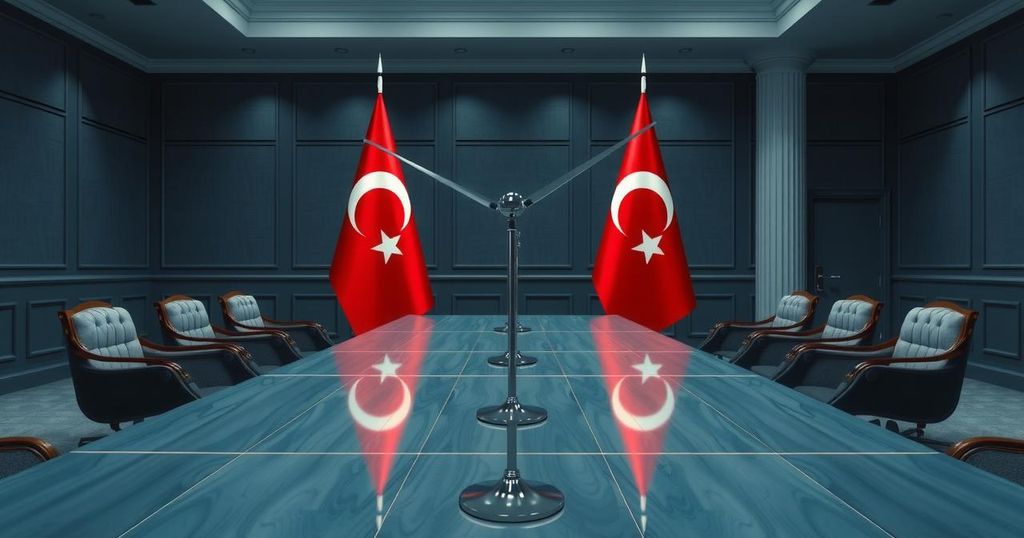China, Russia, and Iran call for diplomacy over sanctions concerning Iran’s nuclear program during a Beijing meeting. Amid U.S. pressure, these countries advocate for a return to the 2015 JCPOA and illustrate their collective interest in curbing nuclear weapons development through negotiations. The dynamics of their alliance suggest a shift in power structures in international relations, setting the stage for future diplomatic efforts.
In a recent diplomatic meeting on Iran’s nuclear program, China, Russia, and Iran advocated for a return to diplomacy instead of imposing sanctions. The dialogue, held in Beijing, follows comments from U.S. President Donald Trump about the need for a new deal or military action concerning Iran. Chinese officials emphasized the importance of avoiding sanctions and military threats, suggesting that the root causes of the situation must be addressed through collaborative efforts.
The discussion occurred against the backdrop of pressing deadlines related to the 2015 Iran nuclear deal, also known as the Joint Comprehensive Plan of Action (JCPOA). This agreement aimed to limit Iran’s nuclear activities in exchange for lifting sanctions. However, following the U.S. withdrawal from the JCPOA, China has criticized the continuation of American sanctions, arguing for the necessity of reinstating diplomatic relations to prevent further escalation of tensions.
The urgency surrounding the resolution of Iran’s nuclear ambitions has intensified, particularly due to heightened conflicts in the Middle East and warnings from the International Atomic Energy Agency regarding Iran’s increased uranium stockpiles. Trump’s administration has reimplemented a stringent sanction regime, with a clear preference expressed by Trump for negotiations over military intervention, complicating the diplomatic landscape.
Observers suggest that the meeting signifies China’s broader intent to establish itself as a dominant global leader during a period of shifting international relations, especially as the U.S. adopts an “America First” strategy. Analysts note that by facilitating this dialogue, China seeks to enhance its regional influence and portray itself as a responsible global power.
China’s long-term support for the JCPOA contrasts sharply with U.S. policies, and recent discussions highlight a potential alliance between Beijing, Moscow, and Tehran against Western hegemony. The alignment of interests among these countries raises the stakes for future diplomatic negotiations, as the collective aim is to assert non-Western approaches to resolving global challenges.
During the meeting, the three nations reiterated their commitment to the Treaty on the Non-Proliferation of Nuclear Weapons and welcomed Iran’s statement regarding the peaceful nature of its nuclear program. This collaboration indicates that both China and Russia are keen to maintain dialogue that discourages any advances toward nuclear weaponization in Iran, while also asserting their influence in shaping the response to the Western-led negotiations.
China’s increasing involvement in the Iran nuclear issue reflects its strategic interests in the Middle East. As the region’s energy dynamics evolve, China’s relationships with Iran and other Gulf states are becoming increasingly crucial. Observers caution, however, that despite these rapprochements, China’s limited experience in mediating international disputes means its role may still be limited compared to that of established powers like the U.S.
In conclusion, the recent discussions between China, Iran, and Russia illustrate a cautious yet determined effort to foster diplomatic resolutions to the complexities surrounding Iran’s nuclear program. As the global community watches the developments closely, the dynamics between these nations and their negotiation strategies may redefine traditional power structures in international relations.
The meeting in Beijing among China, Russia, and Iran underscores a decisive diplomatic push to resolve tensions surrounding Iran’s nuclear program. Emphasizing a return to the 2015 JCPOA framework, these countries articulate a collective stance against unilateral sanctions imposed by the United States. China’s growing role as a mediator could potentially reshape diplomatic relations in the Middle East, while also highlighting its strategic interests and influence within the region.
Original Source: www.crossroadstoday.com






